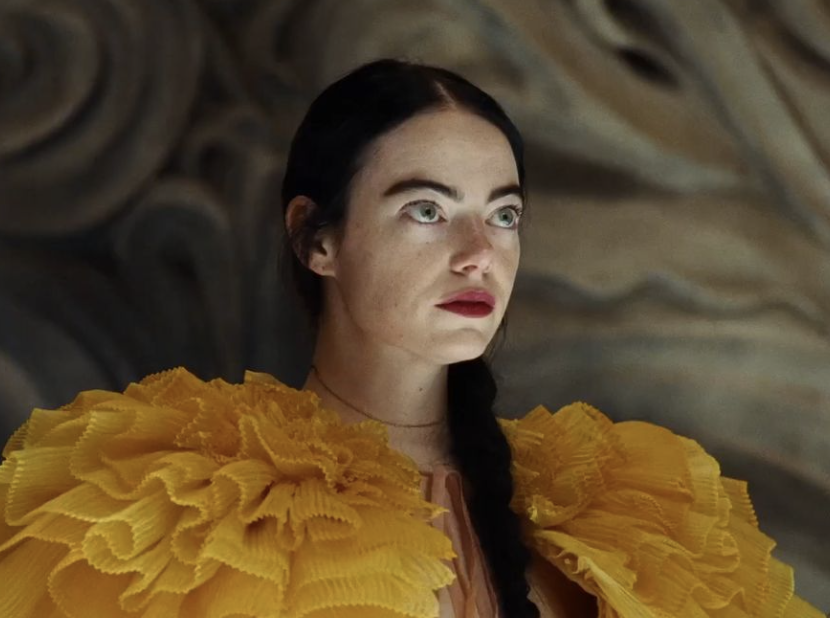
IT’S A SIMPLE enough premise: A mad scientist (Willem Dafoe) working out of a lab clearly bequeathed to him by Dr. Frankenstein, saves the life of a drowned pregnant woman, Bella Baxter (Emma Stone), by switching her dead brain with that of the baby within her and re-animates her. Simples. The scientist, Dr. Godwin Baxter, who Bella calls God, has made his first creation. And voila: into his world is ‘born’ a physically fully grown woman with the brain of a baby. She is his creation but in effect her own child. The intellectual development of her brain, like the growth of her hair – two inches per day – progresses at an exponential speed. And we follow the development of this child cum infant cum toddler as she learns how to talk, walk and interact with society beyond smashing plates and spitting out the food she doesn’t like (as children tend to do). She learns how to become human.
She, along with Godwin the scientist/creator, and a devoted housekeeper (Vicki Pepperdine), all live in an hermetically sealed world. Their own private Eden. It is a bizarre place where chimeras (she interacts with a half dog, half duck entity) wander around. And into this world, a young medical student, Max (Ramy Youssef), is invited to enter. His job is to meticulously record all the visible results of God’s bold experiment. He notes Bella’s speech patterns, the development of her motor neuron skills: walking, and her dawning awareness of the world around her.
He is patient and non-judgmental; he wins her trust and affection. But, unlike his neutered boss, Max cannot but recognize that this child has the body of a very sexy, innocently inhibition-free, woman. Her own big breakthrough is her discovery -using what seems to be an apple- of masturbation and orgasm. And thus, Bella, the bold experiment of a man playing God, has made the leap from sentient being to a sexual one.
Eve has discovered her own paradise.
And so, as with any fledgling adult, she must leave the womb of her world for the, inventively original/bizarre/surreal, world without. There, the maturing Bella, arrives at the profound truth that self-fulfilment extends way beyond self-gratification. Her route out into this ‘real world’ is via a lawyer, Duncan Wedderburn, a louche, decadent self-styled Casanova (an absolutely riveting performance by Mark Ruffalo). He sees her simply as an easy lay. Perhaps it should have been the other way round.
His mistake animates the narrative of the heart of the tale: the dichotomy of how the world (mainly men) see her/women – as submissive, as conquest, whore, property, child-bearer – in contrast with how she sees herself in relation to this world. The story constantly illustrates examples of her anti-social behaviour, particularly in public places. This behaviour is just expression of the core idea: that she – this self-made (her own child’s brain within herself) woman- refuses to be put in her place and socialized and defined by society’s accepted norms of behaviour. She is the ultimate existentialist entity: someone who is faithful to her own idea of self, indeed what it means to be human, and who refuses to be simply the product of society’s creation.
The movie poses the questions: At what point does socialization (learning how to conform to society’s rules) result in social conditioning? How does the individual retain individuality in the face of society’s demand for conformity?
And at the heart of conformity…the very heart of creation is of course, sex.
The movie uses sex and nudity as its creative vehicle. At one point, her husband tries to drug her, in order to have a clitorectomy performed so that she can become what women are supposed to be: sexually neutered wombs for Handmaiden’s Tale style propagation; and, as she had learned as a prostitute, for their own private sexual gratification. Female empowerment and female sexuality is, by whole swaths of society and most religions, a deeply, viscerally feared thing. It is Adam’s primal fear of Eve: a woman with agency.
Bella is a woman with agency; not just a “poor (and therefore to be pitied) thing”.
Director Yorgos Lanthimos’ fabulously unrestrained fantasy style (some of the most inventive production and costume design this year) that constantly switches colour palates and perspectives is perfect for his story. It allows him to ‘get away’ with his character’s outrageousness. Every scene of nudity and sex is his in-your-face challenge to the audience’s submissiveness to imposed standards of ‘decency’ and to recognize the urgency of his conceit about female agency and personal empowerment.
This type of movie-making is difficult to pull-off; its weirdness can easily make it simply silly. But the powerful seriousness of its theme that has clearly been personally (it feels) embraced by its three principle actors – Stone, Dafoe and Ruffalo – and the compelling visionary world created, make this the absolute outstanding movie of the year.
It’ll be Emma’s second Oscar winner.
POOR THINGS Dir: Yorgos Lanthimos. With: Emma Stone (La La Land, Birdman, The Favourite), Willem Dafoe, Mark Ruffalo, Ramy Youssef, Vicki Pepperdine. Writer: Tony McNamara (Cruella and the creator of The Great), from the book by Alasdair Gray. Costume and Production Design: Shona Heath and James Price (Paddington 2). Cinematographer: Robbie Ryan (The Favourite)
